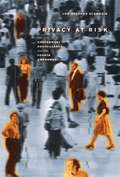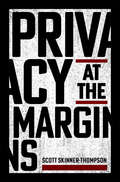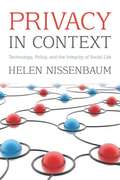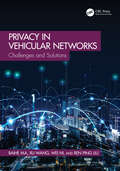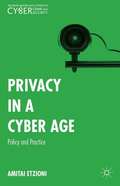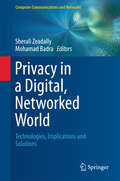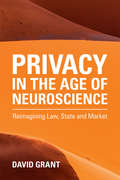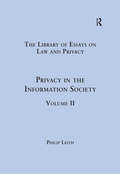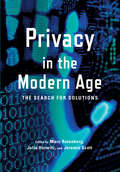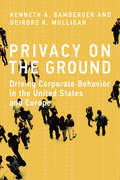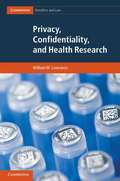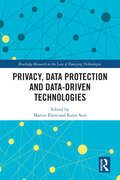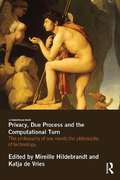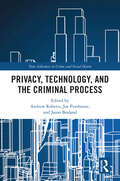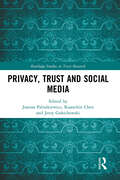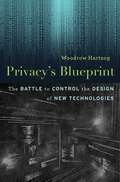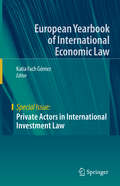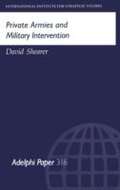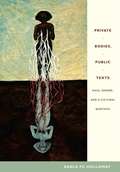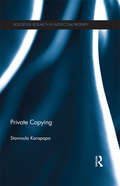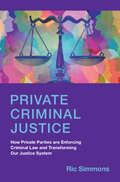- Table View
- List View
Privacy at Risk: The New Government Surveillance and the Fourth Amendment
by Christopher SloboginWithout our consent and often without our knowledge, the government can constantly monitor many of our daily activities, using closed circuit TV, global positioning systems, and a wide array of other sophisticated technologies. With just a few keystrokes, records containing our financial information, phone and e-mail logs, and sometimes even our medical histories can be readily accessed by law enforcement officials. As Christopher Slobogin explains in Privacy at Risk, these intrusive acts of surveillance are subject to very little regulation. Applying the Fourth Amendment’s prohibition on unreasonable searches and seizures, Slobogin argues that courts should prod legislatures into enacting more meaningful protection against government overreaching. In setting forth a comprehensive framework meant to preserve rights guaranteed by the Constitution without compromising the government’s ability to investigate criminal acts, Slobogin offers a balanced regulatory regime that should intrigue everyone concerned about privacy rights in the digital age.
Privacy at Risk: The New Government Surveillance and the Fourth Amendment
by Christopher SloboginWithout our consent and often without our knowledge, the government can constantly monitor many of our daily activities, using closed circuit TV, global positioning systems, and a wide array of other sophisticated technologies. With just a few keystrokes, records containing our financial information, phone and e-mail logs, and sometimes even our medical histories can be readily accessed by law enforcement officials. As Christopher Slobogin explains in Privacy at Risk, these intrusive acts of surveillance are subject to very little regulation. Applying the Fourth Amendment’s prohibition on unreasonable searches and seizures, Slobogin argues that courts should prod legislatures into enacting more meaningful protection against government overreaching. In setting forth a comprehensive framework meant to preserve rights guaranteed by the Constitution without compromising the government’s ability to investigate criminal acts, Slobogin offers a balanced regulatory regime that should intrigue everyone concerned about privacy rights in the digital age.
Privacy at the Margins
by Scott Skinner-ThompsonLimited legal protections for privacy leave minority communities vulnerable to concrete injuries and violence when their information is exposed. In Privacy at the Margins, Scott Skinner-Thompson highlights why privacy is of acute importance for marginalized groups. He explains how privacy can serve as a form of expressive resistance to government and corporate surveillance regimes - furthering equality goals - and demonstrates why efforts undertaken by vulnerable groups (queer folks, women, and racial and religious minorities) to protect their privacy should be entitled to constitutional protection under the First Amendment and related equality provisions. By examining the ways even limited privacy can enrich and enhance our lives at the margins in material ways, this work shows how privacy can be transformed from a liberal affectation to a legal tool of liberation from oppression.
Privacy in Context
by Helen NissenbaumPrivacy is one of the most urgent issues associated with information technology and digital media. This book claims that what people really care about when they complain and protest that privacy has been violated is not the act of sharing information itself-most people understand that this is crucial to social life -but the inappropriate, improper sharing of information. Arguing that privacy concerns should not be limited solely to concern about control over personal information, Helen Nissenbaum counters that information ought to be distributed and protected according to norms governing distinct social contexts-whether it be workplace, health care, schools, or among family and friends. She warns that basic distinctions between public and private, informing many current privacy policies, in fact obscure more than they clarify. In truth, contemporary information systems should alarm us only when they function without regard for social norms and values, and thereby weaken the fabric of social life.
Privacy in Vehicular Networks: Challenges and Solutions
by Baihe Ma Xu Wang Wei Ni Ren Ping LiuIn an era where vehicular networks and Location-Based Services (LBS) are rapidly expanding, safeguarding location privacy has become a critical challenge. Privacy in Vehicular Networks delves into the complexities of protecting sensitive location data within the dynamic and decentralized environment of vehicular networks. This book stands out by addressing both the theoretical and practical aspects of location privacy, offering a thorough analysis of existing vulnerabilities and innovative solutions.This book meticulously examines the interplay between location privacy and the operational necessities of road networks. It introduces a differential privacy framework tailored specifically for vehicular environments, ensuring robust protection against various types of privacy breaches. By integrating advanced detection algorithms and personalized obfuscation schemes, the book provides a multi-faceted approach to enhancing location privacy without compromising data utility.The key features of this book can be summarized as follows: Comprehensive Analysis: Detailed examination of location privacy requirements and existing preservation mechanisms Innovative Solutions: Introduction of a Personalized Location Privacy-Preserving (PLPP) mechanism based on Road Network-Indistinguishability (RN-I) Advanced Detection: Utilization of Convolutional Neural Networks (CNN) for detecting illegal trajectories and enhancing data integrity Collective Security: Implementation of the Cloaking Region Obfuscation (CRO) mechanism to secure multiple vehicles in high-density road networks Holistic Approach: Joint Trajectory Obfuscation and Pseudonym Swapping (JTOPS) mechanism to seamlessly integrate privacy preservation with traffic management Future-Ready: Exploration of upcoming challenges and recommendations for future research in vehicular network privacy This book is essential for researchers, practitioners, and policymakers in the fields of vehicular networks, data privacy, and cybersecurity. It provides valuable insights for anyone involved in the development and implementation of LBS, ensuring they are equipped with the knowledge to protect user privacy effectively.
Privacy in a Cyber Age
by Amitai EtzioniThis book lays out the foundation of a privacy doctrine suitable to the cyber age. It limits the volume, sensitivity, and secondary analysis that can be carried out. In studying these matters, the book examines the privacy issues raised by the NSA, publication of state secrets, and DNA usage.
Privacy in a Digital, Networked World
by Sherali Zeadally Mohamad BadraThis comprehensive textbook/reference presents a focused review of the state of the art in privacy research, encompassing a range of diverse topics. The first book of its kind designed specifically to cater to courses on privacy, this authoritative volume provides technical, legal, and ethical perspectives on privacy issues from a global selection of renowned experts. Features: examines privacy issues relating to databases, P2P networks, big data technologies, social networks, and digital information networks; describes the challenges of addressing privacy concerns in various areas; reviews topics of privacy in electronic health systems, smart grid technology, vehicular ad-hoc networks, mobile devices, location-based systems, and crowdsourcing platforms; investigates approaches for protecting privacy in cloud applications; discusses the regulation of personal information disclosure and the privacy of individuals; presents the tools and the evidence to better understand consumers' privacy behaviors.
Privacy in the Age of Neuroscience: Reimagining Law, State and Market
by David GrantNeuroscience has begun to intrude deeply into what it means to be human, an intrusion that offers profound benefits but will demolish our present understanding of privacy. In Privacy in the Age of Neuroscience, David Grant argues that we need to reconceptualize privacy in a manner that will allow us to reap the rewards of neuroscience while still protecting our privacy and, ultimately, our humanity. Grant delves into our relationship with technology, the latest in what he describes as a historical series of 'magnitudes', following Deity, the State and the Market, proposing the idea that, for this new magnitude (Technology), we must control rather than be subjected to it. In this provocative work, Grant unveils a radical account of privacy and an equally radical proposal to create the social infrastructure we need to support it.
Privacy in the Information Society: Volume II (The Library of Essays on Law and Privacy #2)
by Philip LeithInformation society projects promise wealth and better services to those countries which digitise and encourage the consumer and citizen to participate. As paper recedes into the background and digital data becomes the primary resource in the information society, what does this mean for privacy? Can there be privacy when every communication made through ever-developing ubiquitous devices is recorded? Data protection legislation developed as a reply to large scale centralised databases which contained incorrect data and where data controllers denied access and refused to remedy information flaws. Some decades later the technical world is very different one, and whilst data protection remains important, the cries for more privacy-oriented regulation in commerce and eGov continue to rise. What factors should underpin the creation of new means of regulation? The papers in this collection have been drawn together to develop the positive and negative effects upon the information society which privacy regulation implies.
Privacy in the Modern Age
by Marc Rotenberg Jeramie Scott Julia HorwitzThe threats to privacy are well known: the National Security Agency tracks our phone calls; Google records where we go online and how we set our thermostats; Facebook changes our privacy settings when it wishes; Target gets hacked and loses control of our credit card information; our medical records are available for sale to strangers; our children are fingerprinted and their every test score saved for posterity; and small robots patrol our schoolyards and drones may soon fill our skies.The contributors to this anthology don't simply describe these problems or warn about the loss of privacy-they propose solutions. They look closely at business practices, public policy, and technology design, and ask, "Should this continue? Is there a better approach?" They take seriously the dictum of Thomas Edison: "What one creates with his hand, he should control with his head." It's a new approach to the privacy debate, one that assumes privacy is worth protecting, that there are solutions to be found, and that the future is not yet known. This volume will be an essential reference for policy makers and researchers, journalists and scholars, and others looking for answers to one of the biggest challenges of our modern day. The premise is clear: there's a problem--let's find a solution.
Privacy in the New Media Age
by Jon L. MillsBalancing personal dignity and first amendment concerns has become increasingly challenging in the new media age, when, for example, bloggers have no editors and perhaps no moral restraints. Unlimited and unrestricted internet speech has left thousands of victims in its wake, most of them silenced after the media cycle moves on. While the history of free speech and press has noble origins rooted in democratic theory, how does society protect those who are harassed, stalked, and misrepresented online while maintaining a free society?Jon Mills, one of the nation’s top privacy experts and advocates, maps out this complex problem. He discusses the need for forethought and creative remedies, looking at solutions already implemented by the European Union and comparing them to the obsolete privacy laws still extant in the United States. In his search for solutions, Mills closely examines an array of cases, some of them immediately recognizable because of their notoriety and extensive media coverage. In a context of almost instantaneous global communications, where technology moves faster than the law, Mills traces the sharp edge between freedom of expression and the individual dignity that privacy preserves.
Privacy on the Ground: Driving Corporate Behavior in the United States and Europe (Information Policy)
by Kenneth A. Bamberger Deirdre K. MulliganAn examination of corporate privacy management in the United States, Germany, Spain, France, and the United Kingdom, identifying international best practices and making policy recommendations. Barely a week goes by without a new privacy revelation or scandal. Whether by hackers or spy agencies or social networks, violations of our personal information have shaken entire industries, corroded relations among nations, and bred distrust between democratic governments and their citizens. Polls reflect this concern, and show majorities for more, broader, and stricter regulation—to put more laws “on the books.” But there was scant evidence of how well tighter regulation actually worked “on the ground” in changing corporate (or government) behavior—until now. This intensive five-nation study goes inside corporations to examine how the people charged with protecting privacy actually do their work, and what kinds of regulation effectively shape their behavior. And the research yields a surprising result. The countries with more ambiguous regulation—Germany and the United States—had the strongest corporate privacy management practices, despite very different cultural and legal environments. The more rule-bound countries—like France and Spain—trended instead toward compliance processes, not embedded privacy practices. At a crucial time, when Big Data and the Internet of Things are snowballing, Privacy on the Ground helpfully searches out the best practices by corporations, provides guidance to policymakers, and offers important lessons for everyone concerned with privacy, now and in the future.
Privacy, Big Data, and the Public Good
by Helen Nissenbaum Julia Lane Victoria Stodden Stefan Bender Julia Lane Victoria Stodden Stefan BenderMassive amounts of data on human beings can now be analyzed. Pragmatic purposes abound, including selling goods and services, winning political campaigns, and identifying possible terrorists. Yet 'big data' can also be harnessed to serve the public good: scientists can use big data to do research that improves the lives of human beings, improves government services, and reduces taxpayer costs. In order to achieve this goal, researchers must have access to this data - raising important privacy questions. What are the ethical and legal requirements? What are the rules of engagement? What are the best ways to provide access while also protecting confidentiality? Are there reasonable mechanisms to compensate citizens for privacy loss? The goal of this book is to answer some of these questions. The book's authors paint an intellectual landscape that includes legal, economic, and statistical frameworks. The authors also identify new practical approaches that simultaneously maximize the utility of data access while minimizing information risk.
Privacy, Confidentiality, and Health Research
by William W. LowranceThe potential of the e-health revolution, increased data sharing, database linking, biobanks and new techniques such as geolocation and genomics to advance human health is immense. For the full potential to be realized, though, privacy and confidentiality will have to be dealt with carefully. Problematically, many conventional approaches to such pivotal matters as consent, identifiability, and safeguarding and security are inadequate. In many places, research is impeded by an overgrown thicket of laws, regulations, guidance and governance. The challenges are being heightened by the increasing use of biospecimens, and by the globalization of research in a world that has not globalized privacy protection. Drawing on examples from many developed countries and legal jurisdictions, the book critiques the issues, summarizes various ethics, policy, and legal positions (and revisions underway), describes innovative solutions, provides extensive references and suggests ways forward.
Privacy, Data Protection and Data-driven Technologies (Routledge Research in the Law of Emerging Technologies)
by Martin Ebers Karin SeinThis book brings together contributions from leading scholars in law and technology, analysing the privacy issues raised by new data-driven technologies.Highlighting the challenges that technology poses to existing European Union (EU) data protection laws, the book assesses whether current legal frameworks are fit for purpose, while maintaining a balance between supporting innovation and the protection of individual’s privacy. Data privacy issues range from targeted advertising and facial recognition, systems based on artificial intelligence (AI) and blockchain, and machine-to-machine (M2M) communication, to technologies that enable the detection of emotions and personal care robots.The book will be of interest to scholars, policymakers and practitioners working in the fields of law and technology, EU law and data protection.
Privacy, Due Process and the Computational Turn: The Philosophy of Law Meets the Philosophy of Technology
by Mireille Hildebrandt Katja De VriesPrivacy, Due process and the Computational Turn: The Philosophy of Law Meets the Philosophy of Technology engages with the rapidly developing computational aspects of our world including data mining, behavioural advertising, iGovernment, profiling for intelligence, customer relationship management, smart search engines, personalized news feeds, and so on in order to consider their implications for the assumptions on which our legal framework has been built. The contributions to this volume focus on the issue of privacy, which is often equated with data privacy and data security, location privacy, anonymity, pseudonymity, unobservability, and unlinkability. Here, however, the extent to which predictive and other types of data analytics operate in ways that may or may not violate privacy is rigorously taken up, both technologically and legally, in order to open up new possibilities for considering, and contesting, how we are increasingly being correlated and categorizedin relationship with due process – the right to contest how the profiling systems are categorizing and deciding about us.
Privacy, Technology, and the Criminal Process (New Advances in Crime and Social Harm)
by Andrew Roberts, Joe Purshouse, and Jason BoslandThis collection considers the implications for privacy of the utilisation of new technologies in the criminal process. In most modern liberal democratic states, privacy is considered a basic right. Many national constitutions, and almost all international human rights instruments, include some guarantee of privacy. Yet privacy interests appear to have had relatively little influence on criminal justice policy making. The threat that technology poses to these interests demands critical re-evaluation of current law, policy, and practice. This is provided by the contributions to this volume. They offer legal, criminological, philosophical and comparative perspectives. The book will be of interest to legal and criminological scholars and postgraduate students. Its interdisciplinary methodology and focus on the intersection between law and technology make it also relevant for philosophers, and those interested in science and technology studies.
Privacy, Trust and Social Media (Routledge Studies in Trust Research)
by Jerzy Gołuchowski Joanna Paliszkiewicz Kuanchin ChenTrust is important – it influences new technologies adoption and learning, enhances using social media, new technologies, IoT, and blockchain, and it contributes to the practical implementations of cybersecurity policy in organizations. This edited research volume examines the main issues and challenges associated with privacy and trust on social media in a manner relevant to both practitioners and scholars. Readers will gain knowledge across disciplines on trust and related concepts, theoretical underpinnings of privacy issues and trust on social media, and empirically-validated trust-building practice on social media. Social Media, Privacy Issues and Trust-building aims to bring together the theory and practice of social media, privacy issues, and trust. It offers a look at the current state of trust and privacy, including a comprehensive overview of both research and practical applications. It shows the latest state of knowledge on the topic and will be of interest to researchers, students at an advanced level, and academics, in the fields of business ethics, entrepreneurship, management of technology and innovation, marketing, and information management. Practitioners can also use the book as a toolbox to improve their understanding and promote opportunities related to building social media trust while taking into consideration of privacy issues.
Privacy, Trust and Social Media (Routledge Studies in Trust Research)
by Jerzy Gołuchowski Joanna Paliszkiewicz Kuanchin ChenTrust is important – it influences new technologies adoption and learning, enhances using social media, new technologies, IoT, and blockchain, and it contributes to the practical implementations of cybersecurity policy in organizations. This edited research volume examines the main issues and challenges associated with privacy and trust on social media in a manner relevant to both practitioners and scholars. Readers will gain knowledge across disciplines on trust and related concepts, theoretical underpinnings of privacy issues and trust on social media, and empirically-validated trust-building practice on social media. Social Media, Privacy Issues and Trust-building aims to bring together the theory and practice of social media, privacy issues, and trust. It offers a look at the current state of trust and privacy, including a comprehensive overview of both research and practical applications. It shows the latest state of knowledge on the topic and will be of interest to researchers, students at an advanced level, and academics, in the fields of business ethics, entrepreneurship, management of technology and innovation, marketing, and information management. Practitioners can also use the book as a toolbox to improve their understanding and promote opportunities related to building social media trust while taking into consideration of privacy issues.
Privacy’s Blueprint: The Battle to Control the Design of New Technologies
by Woodrow HartzogEvery day, Internet users interact with technologies designed to undermine their privacy. Social media apps, surveillance technologies, and the Internet of Things are all built in ways that make it hard to guard personal information. And the law says this is okay because it is up to users to protect themselves—even when the odds are deliberately stacked against them. In Privacy’s Blueprint, Woodrow Hartzog pushes back against this state of affairs, arguing that the law should require software and hardware makers to respect privacy in the design of their products. Current legal doctrine treats technology as though it were value-neutral: only the user decides whether it functions for good or ill. But this is not so. As Hartzog explains, popular digital tools are designed to expose people and manipulate users into disclosing personal information. Against the often self-serving optimism of Silicon Valley and the inertia of tech evangelism, Hartzog contends that privacy gains will come from better rules for products, not users. The current model of regulating use fosters exploitation. Privacy’s Blueprint aims to correct this by developing the theoretical underpinnings of a new kind of privacy law responsive to the way people actually perceive and use digital technologies. The law can demand encryption. It can prohibit malicious interfaces that deceive users and leave them vulnerable. It can require safeguards against abuses of biometric surveillance. It can, in short, make the technology itself worthy of our trust.
Private Actors in International Investment Law (European Yearbook of International Economic Law)
by Katia Fach GómezThis book presents the first critical review of the less frequently addressed stakeholders in international investment law. Focusing on private actors, including but not limited to lawyers, experts, funders, civil society, the media and scholars, the book highlights the variety of actors that help shape international investment law and demonstrates how best to manage their interactions in order to achieve synergies and enhance the legitimacy of this pluralistic field.
Private Armies And Military Intervention
by David ShearerThe nature and role of paid foreign forces have altered considerably in the late twentieth century. ‘Military companies’ – private firms providing active military assistance, in some cases involving combat – have exploited the increasing reluctance of Western governments and multilateral organizations to intervene directly in civil conflicts. As a result, their influence has increased. David Shearer argues that the debate over the use of these companies – notably the South African firm Executive Outcomes (EO) – has not, however, kept pace with their development. Companies such as EO are widely seen as merely modern-day mercenary outfits exploiting violence for private gain. <p><p> Shearer contends that the need to recast the debate on military companies is urgent. These companies are not a passing phenomenon; if anything, their influence and activities are set to increase in the next century as Western military retrenchment continues. Efforts to restrict the activities of military companies by drafting international or domestic legislation have to date been ineffective, and are likely to remain so. <p> This paper – the first detailed analysis of the private military sector – argues that dismissing it as an unpleasant aberration is misleading and unhelpful. Military companies can claim success in achieving immediate strategic objectives. The author cites two examples at length – EO’s operations in Angola in 1993–94, and in Sierra Leone in 1995–96 – and suggests that military force can stabilize a crisis. Engagement with military companies may create possibilities for them to complement international and regional peacekeeping efforts. Traditional UN peacekeeping is flawed in terms of its speed of mobilization and lines of authority, and is hampered by interference from contributing countries. The private sector may avoid many of these difficulties. <p> Private Armies and Military Intervention concludes that transparency of operations and business relationships is a crucial first step towards ensuring the accountability of the private military sector. However, a coherent policy towards military companies has yet to be formulated. Current frameworks under international law are insufficient and inappropriate. Characterizing the activities of military companies as ‘mercenary’ offers few useful means to tackle the issue within a framework of international policy. What is required is a more pragmatic approach that assesses the effectiveness of – and engages with – private armies.
Private Bodies, Public Texts: Race, Gender, and a Cultural Bioethics
by Karla Fc HollowayIn Private Bodies, Public Texts, Karla FC Holloway examines instances where medical issues and information that would usually be seen as intimate, private matters are forced into the public sphere. As she demonstrates, the resulting social dramas often play out on the bodies of women and African Americans. Holloway discusses the spectacle of the Terri Schiavo right-to-die case and the injustice of medical researchers' use of Henrietta Lacks's cell line without her or her family's knowledge or permission. She offers a provocative reading of the Tuskegee syphilis study and a haunting account of the ethical dilemmas that confronted physicians, patients, and families when a hospital became a space for dying rather than healing during Hurricane Katrina; even at that dire moment, race mattered. Private Bodies, Public Texts is a compelling call for a cultural bioethics that attends to the historical and social factors that render some populations more vulnerable than others in medical and legal contexts. Holloway proposes literature as a conceptual anchor for discussions of race, gender, bioethics, and the right to privacy. Literary narratives can accommodate thick description, multiple subjectivities, contradiction, and complexity.
Private Copying (Routledge Research in Intellectual Property)
by Stavroula KarapapaThis book offers an original analysis of private copying and determines its actual scope as an area of end-user freedom. The basis of this examination is Article 5(2)(b) of the Copyright Directive. Despite the fact that copying for private and non-commercial use is permitted by virtue of this article and the national laws that implemented it, there is no mandate that this privilege should not be technologically or contractually restricted. Because the legal nature of private copying is not settled, users may consider that they have a ‘right’ to private copying, whereas rightholders are in position to prohibit the exercise of this ‘right’. With digital technology and the internet, this tension has become prominent: the conceptual contours of permissible private copying, namely the private and non-commercial character of the use, do not translate well, and tend to be less clear in the digital context. With the permissible limits of private copying being contested and without clarity as to the legal nature of the private coping limitation, the scope of user freedom is being challenged. Private use, however, has always remained free in copyright law. Not only is it synonymous with user autonomy via the exhaustion doctrine, but it also finds protection under privacy considerations which come into play at the stage of copyright enforcement. The author of this book argues that the rationale for a private copying limitation remains unaltered in the digital world and maintains there is nothing to prevent national judges from interpreting the legal nature of private copying as a ‘sacred’ privilege that can be enforced against possible restrictions. Private Copying will be of particular interest to academics, students and practitioners of intellectual property law.
